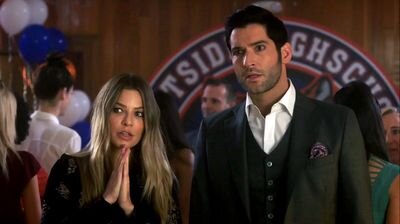Since I actually, kind of enjoyed Mistletoe Inn, I decided to try one more Hallmark movie about a writer. I regret my decision. Although, full disclosure I missed bits of the beginning.
Cassie (Jen Lilley) is the daughter of a celebrated novelist and Princeton professor. She has just published her own first book following her divorce, a romance memoir full of humor and real-life inspired feelings. Her publisher asks bestselling fantasy author Elliot (Kevin McGarry) to help Cassie with being comfortable doing book readings and signings. He agrees and the pair go on tour together along with Elliot’s adorable dog, Bungee. Blah blah blah, they fall in love, they have a misunderstanding, they end up together. Oops, did I spoil it?
First of all, in the scenes where Elliot’s books are being read out loud, they still sound like the style of a romance novel, just with a dragon written in. Then again, his audience did seem to be a lot of twenty-something women who wanted to jump his bones. At least the film was realistic in its decision to show that even published authors who aren’t bestsellers need to supplement their income by showing Cassie as a barista. However, she works in a small coffee shop owned by her roommate. Mom’s a famous author who gave her advice. She lives with her boss. Cassie’s life is a lot of near-nepotism. At least Cassie admits this and chooses not to use her mom’s last name on her own book.
The concept of the book tour itself is a tad cringe. Two almost strangers taking a road trip together while their “point people” make sure they have places to stay in each city felt a little too fancy for a publishing company to pay for. If they hadn’t constantly pointed out that Elliot was making the company LOTS of money, I would have been making psh sounds through the whole movie. Also, they appear on a morning show together. I would understand interviewing Elliot about his popular series, but what kind of strings did they have to pull to let Cassie talk about her book too? (She chokes by the way and Elliot tries to teach her about “public speaking”).
What I did like was that Elliot immediately read her book as a way to get to know her and have a better working relationship. Meanwhile, Cassie is just a snob about his work calling him the “dragon-writer” and sneering as she refers to his work as “nerd novels”. Then she keep apologizing right afterwards like a passive-aggressive “no offense” comment. She learns her lesson, but seriously rude!!!! Cassie is not a particularly likable character, complaining when her room at the bed and breakfast is tiny and acting all superior. Elliot is the best promoter, giving her opportunities that a publishing company would never give unless her books were selling like his. He even confesses to her that he has writer’s block and she says nothing helpful! You’re both writers! Be a writer and try to help the man!
By the last twenty minutes Cassie almost won me over. She finally started to give back professionally to Elliot and was excited to be trying new reading and writing topics. She takes initiative in her own career while appreciating the careers of other authors. AND YET SHE COULD NOT GET OVER THAT ELLIOT HAD A GOOD RELATIONSHIP WITH HIS EX-WIFE. Holy crap! He’s a better person than you. Deal with it.
Also, the dog needed more scenes.











































